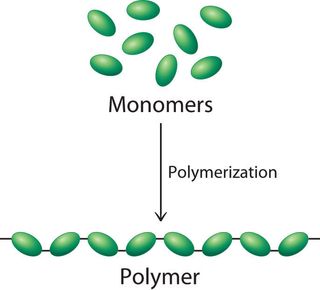Exploring the Varied Applications and Benefits of Polymers in Different Industries
Polymers, with their diverse variety of buildings and performances, have ended up being crucial in various industries, each reaping distinct benefits from their application. Polymers. From enhancing safety and performance in the automotive sector to revolutionizing medical tools in the medical care sector, polymers play a crucial duty. Moreover, their environmentally friendly nature is altering the landscape of sustainability practices. As we explore the midsts of polymers in electronics, we uncover cutting-edge advancements, while their structural integrity changes the world of building and infrastructure. The prevalent impact of polymers across industries is a testimony to their flexibility and adaptability, forming the future of many industries.
Automotive Field Applications
Polymers play an essential function in improving the performance and longevity of various parts within the automotive market. These versatile materials are thoroughly utilized in the manufacturing of various components, ranging from indoor parts to under-the-hood applications. One popular usage of polymers in the automotive industry is in the manufacturing of light-weight components. By replacing typical metal parts with polymer-based options, lorries can attain better fuel effectiveness without jeopardizing on toughness or safety.

Medical Care Industry Advantages
In various healthcare applications, the advantages of using polymers are commonly acknowledged for their diverse variety of helpful properties. Polymers play an important function in the health care market because of their flexibility, biocompatibility, and cost-effectiveness. One of the main advantages of polymers in health care is their capability to be tailored to specific requirements, such as adaptability, longevity, and biodegradability, making them ideal for a vast array of clinical applications.
Polymer-based products are extensively utilized in medical tools, such as catheters, implants, prosthetics, and medication shipment systems, due to their biocompatibility and ability to resemble all-natural tissues. These materials can reduce the risk of allergies or denials, boosting individual security and outcomes. In addition, polymers are light-weight, making them appropriate for wearable medical tools and making sure client comfort.
Additionally, polymers make it possible for the advancement of cutting-edge treatment approaches, such as hydrogels for tissue design and nanocomposites for targeted drug distribution. Their ease of handling and sanitation makes them vital for maintaining high requirements of health in medical care settings. Generally, the varied advantages of polymers contribute significantly to improvements in clinical innovation and client treatment.
Environmental Benefits of Polymers

Additionally, polymers can add to best site power financial savings due to their lightweight nature. In industries such as transportation, lightweight polymer materials can help in reducing gas usage and greenhouse gas exhausts. In addition, polymers can make it possible for the growth of energy-efficient items such as insulation products that boost power preservation in structures.
In addition, polymers play an essential role in decreasing water contamination. The use of polymer-based filtration systems can effectively get rid of toxins and impurities from wastewater, guarding water sources and ecological communities. On the whole, the ecological advantages of read the full info here polymers make them useful possessions in promoting sustainability and environmentally friendly methods across various markets.
Polymers in Electronic Devices and Technology
Thinking about the boosting demand for innovative and lasting options in contemporary markets, the combination of advanced polymer technologies in the realm of electronics and innovation has emerged as a crucial technique for driving efficiency and efficiency. Polymers have changed the electronics industry by allowing the production of lighter, a lot more flexible, and sturdy electronic tools. From smartphones to medical devices, polymers play a vital role in boosting product style and functionality.
One considerable benefit of polymers in electronics is their shielding buildings, which help shield delicate electronic parts from environmental aspects and electric interference. Furthermore, polymers are essential in the growth of versatile display screens, wearable innovation, and published electronic devices, providing limitless opportunities for creating wise and interconnected tools.
Furthermore, making use More Info of polymers in digital product packaging has actually resulted in improvements in miniaturization and thermal monitoring, improving the overall performance and dependability of digital systems. As modern technology remains to develop, the convenience and flexibility of polymers will unquestionably drive better innovation in the electronics industry, shaping the future of technology.
Function of Polymers in Building and Facilities
Polymers use various advantages in the building and construction sector due to their flexibility, sturdiness, and cost-effectiveness. One key duty of polymers in building and construction is their use in coatings and sealers, offering protection versus environmental variables such as wetness, UV radiation, and corrosion.
Additionally, polymers play an essential function in lasting building and construction practices by allowing the growth of energy-efficient frameworks. Insulating materials made from polymers assist control interior temperature levels, decreasing the requirement for home heating and cooling down systems and ultimately lowering energy usage - Polymers.
Verdict
Finally, polymers play an essential function in different sectors such as auto, healthcare, environmental, electronics, and building. Their flexible residential or commercial properties make them useful in producing ingenious options and items. From enhancing fuel effectiveness in cars to improving clinical gadgets, polymers use many benefits. In addition, their effect on decreasing waste and advertising sustainability highlights their value in modern-day applications. The extensive use polymers demonstrates their significant payment to progressing innovation and enhancing high quality of life.